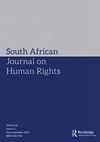Navigating uncharted waters: biobanks and informational privacy in South Africa
IF 0.6
4区 社会学
Q3 LAW
引用次数: 10
Abstract
Abstract Biobanks (organised collections of human biological material and associated information stored for research purposes) are becoming invaluable to human health research. However, concerns have been voiced in the literature that POPIA – the new legislation that aims to protect personal information – may stymie the functioning of South African biobanks. The main reason for the concern is the dichotomy between specific consent (consent to use biological material and associated information for a specific research study) and broad consent (consent to use biological material and associated information for a variety of future research studies): While the current ethical and legal regulatory framework applicable to biobanks in South Africa requires only broad consent, POPIA appears to increase the benchmark to specific consent. A common model for building biobanks in South Africa is what we refer to as the ‘dual consent’ model – namely to obtain both specific consent for an initial research study, and broad consent for storage of material and associated information and the use thereof in future studies. We analyse the provisions of POPIA from a biobanking perspective, and conclude that biobanks that were built using the dual consent model would be able to use their collections of material and associated information for further new research studies, provided they comply with three conditions: (1) non-publication of the genetic information in an identifiable form; (2) the research must be in the public interest; and (3) sufficient guarantees must be in place to protect the research participants’ privacy. However, biobanks that were built using other models that did not include specific consent for the initial research study, would have to opt for either de-identification of their material and associated information, or obtain new specific consent from their research participants for a new research study.在未知的水域航行:南非的生物库和信息隐私
生物银行(为研究目的而存储的人类生物材料和相关信息的有组织的集合)对人类健康研究变得非常宝贵。然而,文献中有人担心,旨在保护个人信息的新立法POPIA可能会阻碍南非生物银行的运作。引起关注的主要原因是具体同意(同意在特定研究中使用生物材料和相关信息)和广泛同意(同意在各种未来研究中使用生物材料和相关信息)之间的二分法:虽然目前适用于南非生物银行的伦理和法律监管框架只需要广泛同意,但POPIA似乎将基准提高到了具体同意。在南非建立生物银行的一种常见模式是我们所说的“双重同意”模式——即既要获得初步研究的具体同意,也要获得材料和相关信息的存储以及在未来研究中使用的广泛同意。我们从生物银行的角度分析了POPIA的规定,并得出结论,使用双重同意模型建立的生物银行将能够将其收集的材料和相关信息用于进一步的新研究,前提是它们符合三个条件:(1)不以可识别的形式公布遗传信息;(二)研究符合社会公共利益;(3)必须有足够的保障来保护研究参与者的隐私。然而,使用其他模型构建的生物库,如果不包括初始研究的具体同意,则必须选择对其材料和相关信息进行去识别,或者从研究参与者那里获得新的具体同意,以进行新的研究。
本文章由计算机程序翻译,如有差异,请以英文原文为准。
求助全文
约1分钟内获得全文
求助全文

 求助内容:
求助内容: 应助结果提醒方式:
应助结果提醒方式:


